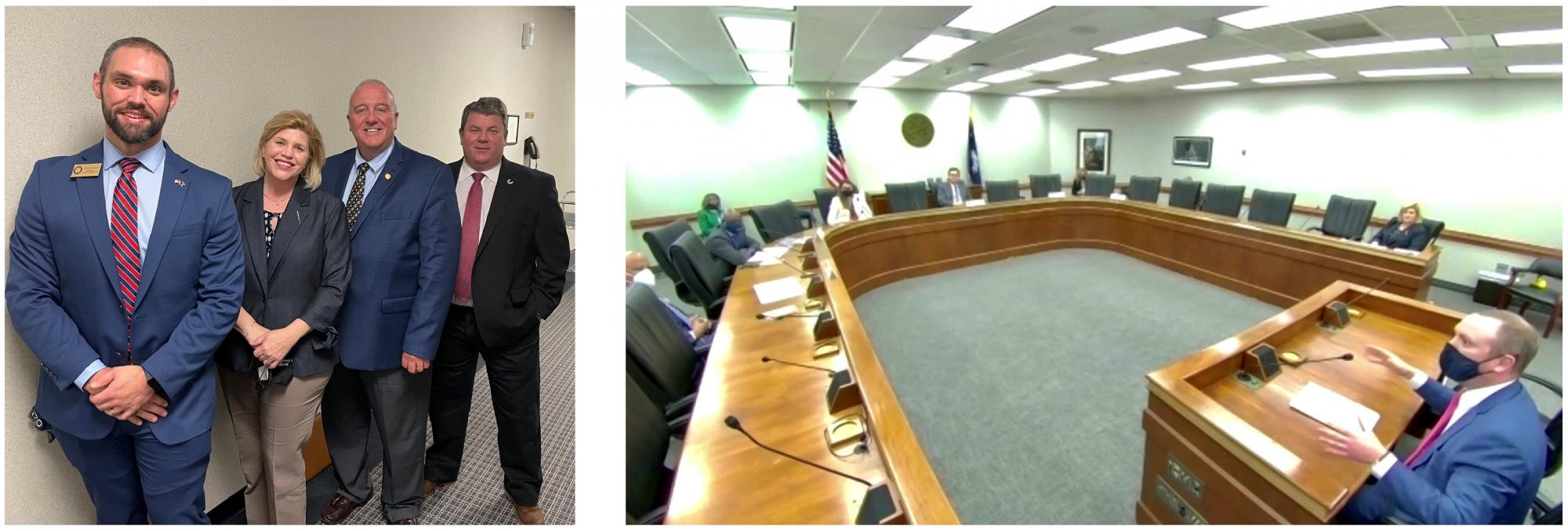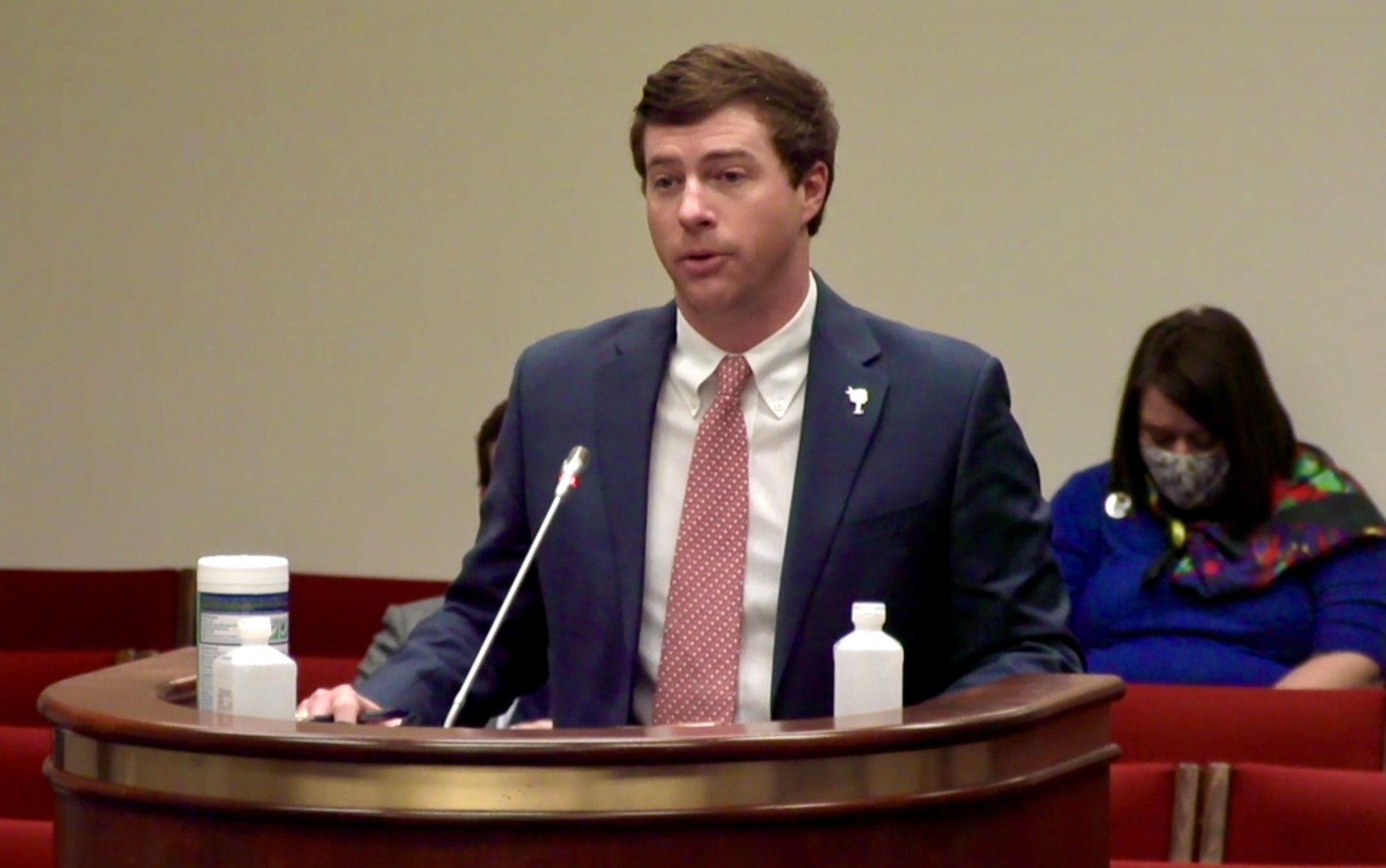The General Assembly spent most of their time this week in committee meetings but did move several bills on the floor. The Ways and Means version of the budget will be debated on the House floor beginning the week of March 22nd. There are several bills of interest this week that will be discussed below.
Revenue, Finance, and Economic Development

Owen McBride testifies before a Senate Finance subcommittee.
Fire District Millage Caps – S. 401. As originally drafted, this bill would allow counties to adopt an ordinance or resolution to suspend the millage rate limitation for the purposes of supporting a fire protection district created pursuant to Chapter 19 of Title 4. SCAC staff, along with David Garner, Abbeville County Director and Vic Carpenter, Kershaw County Administrator worked with Senator Gustafson, the sponsor of the bill, and testified at a Senate Finance subcommittee asking to amend the bill to also include those fire districts created pursuant to Title 6. The subcommittee adopted the amendment as well as an amendment limiting the suspension of the cap to two years after the effective date of the legislation. S. 401 will be on the next full committee’s agenda.
Vehicle Tax Notices – S. 195. This bill would require that tax notices of all vehicles must set forth the fair market value used for the vehicle. A Senate Finance subcommittee adopted an amendment to also require the fair market value to be set forth on tax notices for boats and gave S. 195 a favorable report as amended. The bill will be on the next full committee’s agenda.
Legally Separated Assessment Ratio – S. 527. This bill defines “legally separated” for purposes of the certificate contained in the application for the special 4 percent assessment ratio for owner-occupied residential property, an SCAC policy position. A Senate Finance subcommittee gave S. 527 a favorable report and it will be on the next full committee’s agenda.
Land Use, Natural Resources and Transportation
Electronic Waste (E-Waste) Sunset Extension – H. 4035. This legislation would extend the sunset on the South Carolina Manufacturer Responsibility and Consumer Convenience Information Technology Equipment Collection and Recovery Act and applicable regulations until December 31, 2023. This is an SCAC policy position. The bill would allow a stakeholder working group, including SCAC staff, to continue pursuing efforts to reform the current program and to alleviate the financial burden faced by many counties in storing electronic waste. H. 4035 received a favorable report from the House Agriculture, Natural Resources and Environmental Affairs Committee and is pending second reading on the House calendar.
Anchored Watercraft – H. 3865. This legislation would authorize local governments to adopt an ordinance requiring a permit for a watercraft or floating structure to remain at anchorage on public waters within its local jurisdiction for more than 14 consecutive days. The cost of the permit issued by a local government may not exceed $15. The House Agriculture, Natural Resources and Environmental Affairs Committee gave the bill a favorable report as amended and the bill is pending second reading on the House calendar.
Public Safety, Corrections and Judicial
Tort Claims Act – S. 82. S. 82 raises the existing caps on damages found in the Tort Claims Act (TCA) from $300,000 to $500,000 per individual, and from $600,000 to $1 million per occurrence. The bill also contains a provision to encourage settlement of litigation covered by the TCA. This increase will still have a fiscal impact on county governments, but it is less severe than what was initially proposed last session. This week, the Senate gave S. 82 a second and a third reading as amended and sent it to the House. The bill was referred to the House Judiciary Committee.
First Responder Workers’ Compensation for Psychological Injuries – S. 94. As originally introduced, this bill would exempt first responders from having to establish by a preponderance of the evidence that stress, mental injury, or mental illness arising out of or in the course of employment stems from conditions that are extraordinary or unusual relative to the normal conditions of employment for purposes of collecting workers’ compensation. After three subcommittee hearings and full committee discussion, the Senate Judiciary Committee adopted a strike-all amendment to the bill. The amendment mirrors similar Florida and Connecticut statutes. The new bill language would do the following:
- Exempt first responders from having to establish by a preponderance of the evidence that stress, mental injury, or mental illness diagnosed as post traumatic stress disorder (PTSD) arising from a “significant traumatic experience” in the course of employment stems from conditions that are extraordinary or unusual relative to the normal conditions of employment for purposes of collecting workers’ compensation.
- Define “first responders” as law enforcement officers and firefighters, including volunteers.
- Define “significant traumatic experience” to mean one of 11 defined events. The 11 compensable events in the new language are:
- Witnessing a deceased minor or the death of a minor;
- Witnessing an injury to a minor who subsequently died before or upon arrival at a hospital emergency department;
- Participating in the physical treatment of an injured minor who subsequently died before or upon arrival at a hospital emergency department;
- Manually transporting an injured minor who subsequently died before or upon arrival at a hospital emergency department;
- Seeing for oneself a decedent whose death involved grievous bodily harm;
- Witnessing a death, including suicide, that involved grievous bodily harm;
- Witnessing a homicide regardless of whether the homicide was criminal or excusable, including murder, mass killing (killing 3 or more individuals in a single incident), voluntary manslaughter, involuntary manslaughter, and self-defense;
- Witnessing an injury, including an attempted suicide, to a person who subsequently died before or upon arrival at a hospital emergency department if the person was injured with grievous bodily harm;
- Participating in the physical treatment of an injury, including an attempted suicide, to a person who subsequently died before or upon arrival at a hospital emergency department if the person was injured with grievous bodily harm;
- Manually transporting a person who was injured, including by attempted suicide, and subsequently died before or upon arrival at a hospital emergency department if the person was injured with grievous bodily harm; or
- Using deadly force or being subjected to deadly force in the course of the employment.
- Define “grievous bodily harm” as seriously bodily injury including fractured or dislocated bones, deep cuts, torn members of the body, serious damages to internal organs, and other severe bodily injuries.”
The Senate Judiciary Committee gave the bill a favorable report as amended, and the bill is on the Senate calendar.
County Government and Intergovernmental

Vaping and Tobacco Ordinances – H. 3681. This legislation would provide that after December 31, 2020, political subdivisions would be preempted from regulating the ingredients, flavors, or licensing of cigarettes, electronic smoking devices, e-liquid, vapor products, tobacco products, or alternative nicotine products. However, the use of these products in public areas would still be subject to local laws and ordinances. SCAC testified this week in opposition to the bill. The bill received a favorable report, as amended, from a House Judiciary subcommittee.
State Election Commission – H. 3444. This legislation would require all counties to follow the same practices for elections that are created by the State Election Commission (“SEC”). H. 3444 would provide the SEC with the authority to supervise and standardize the practices of local county election offices. The bill was amended on the floor of the House this week to give the commission and the executive director the power to supervise and standardize the performance, conduct, and practices of the county board of elections and voter registration and to promulgate regulations to effectuate this new power. H. 3444 received a third reading and was sent to the Senate.
Other Items of Interest
SCAC’s Virtual Legislative Update – Friday, March 19, 2021 at 9:00 a.m.
Mark your calendar to join SCAC’s lobbying team for a virtual legislative update on Friday, March 19 at 9:00 a.m. In addition to hearing the latest news about the state budget, you’ll also be briefed on other important legislation that affects county government. Registration information was e-mailed to all county officials on March 4th and is available on SCAC’s website. If you have any questions, please contact SCAC staff at (803) 252-7255 or tollfree at (800) 922-6081, or via e-mail at scac@scac.sc.
Newly-Introduced Legislation
View/Download Full Text for Newly-Introduced Legislation
Note: If you would like to offer comments to the SCAC staff, please call us toll-free at 1-800-922-6081, fax to (803) 252-0379, or send an email. You can also go to www.scstatehouse.gov and click on "Legislation," then "Introduced Legislation."
Senate Bills
S. 653 — Provides that inmates in a detention center may attend certain funeral services and visit hospitalized family members.
S. 654 — Provides that a unit of local government may adopt an ordinance restricting the use of certain pesticide products.
S. 658 — For purposes of the insurance products where the South Carolina Employee Benefit Authority (PEBA) is the sponsor, authorizes PEBA to establish rules for eligibility and enrollment, including the timeframes for submitting enrollment elections and required supporting documentation.
House Bills
H. 4036 — Provides that a person may register to vote in-person and then immediately be allowed to vote at an in-person absentee voting location in the person’s county of residence.
H. 4060 — Provides that the South Carolina Building Codes Council is authorized to deny the Residential Building Codes within a certain time frame.
H. 4061 — Establishes the Optional Shared-Risk Defined Benefit retirement plan and allows an employer to withdraw from the South Carolina Retirement System in certain situations.
H. 4063 — Enacts the “South Carolina Electronic Notary Public Act.”
H. 4064 — Clarifies that manufacturing property owned or leased by a public utility regulated by the South Carolina Public Service Commission does not qualify for a 14.2857 percent property tax exemption.